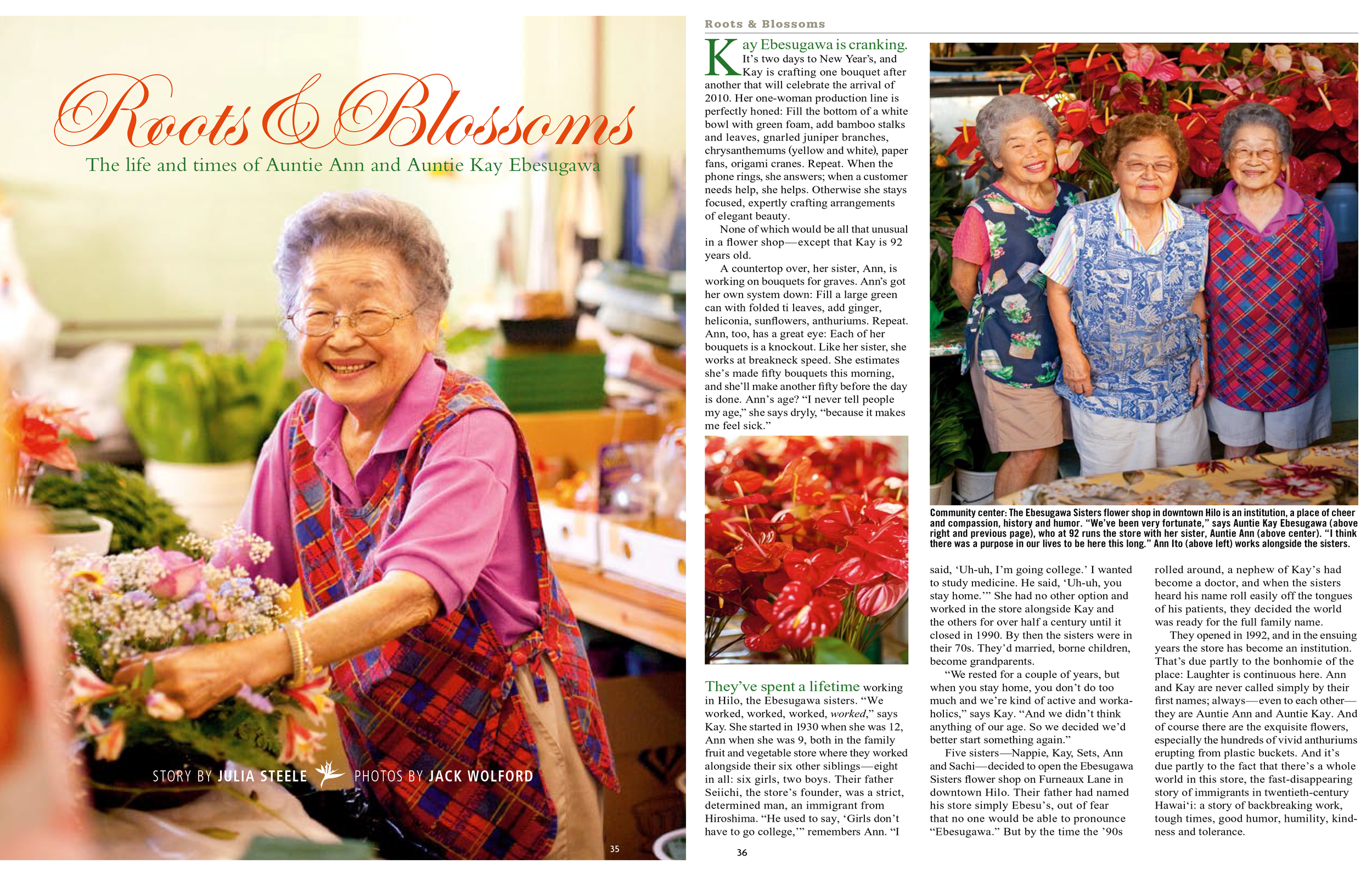Kay Ebesugawa is cranking. It’s two days to New Year’s, and Kay is crafting one bouquet after another that will celebrate the arrival of 2010. Her one-woman production line is perfectly honed: Fill the bottom of a white bowl with green foam, add bamboo stalks and leaves, gnarled juniper branches, chrysanthemums (yellow and white), paper fans, origami cranes. Repeat. When the phone rings, she answers; when a customer needs help, she helps. Otherwise she stays focused, expertly crafting arrangements of elegant beauty.
None of which would be unusual in a flower shop—except that Kay is 92 years old.
A countertop over, her sister, Ann, is working on bouquets for graves. Ann’s got her own system down: Fill a large green can with folded ti leaves, add ginger, heliconia, sunflowers, anthuriums. Repeat. Ann, too, has a great eye: Each of her bouquets is a knockout. Like her sister, she works at breakneck speed. She estimates she’s made fifty bouquets this morning, and she’ll make another fifty before the day is done. Ann’s age? “I never tell people my age,” she says dryly, “because it makes me feel sick.”
They’ve spent a lifetime working in Hilo, the Ebesugawa sisters. “We worked, worked, worked, worked,” says Kay. She started in 1930 when she was 12, Ann when she was 9, both in the family fruit and vegetable store where they worked alongside their six other siblings—eight in all: six girls, two boys. Their father Seiichi, the store’s founder, was a strict, determined man, an immigrant from Hiroshima. “He used to say, ‘Girls don’t have to go college,’” remembers Ann. “I said, ‘Uh-uh, I’m going college.’ I wanted to study medicine. He said, ‘Uh-uh, you stay home.’” She had no other option and worked in the store alongside Kay and the others for over half a century until it closed in 1990. By then the sisters were in their 70s. They’d married, borne children, become grandparents.
“We rested for a couple of years, but when you stay home, you don’t do too much and we’re kind of active and workaholics,” says Kay. “And we didn’t think anything of our age. So we decided we’d better start something again.”
Five sisters—Nappie, Kay, Sets, Ann and Sachi—decided to open the Ebesugawa Sisters flower shop on Furneaux Lane in downtown Hilo. Their father had named his store simply Ebesu’s, out of fear that no one would be able to pronounce “Ebesugawa.” But by the time the ’90s rolled around, a nephew of Kay’s had become a doctor, and when the sisters heard his name roll easily off the tongues of his patients, they decided the world was ready for the full family name.
They opened in 1992, and in the ensuing years the store has become an institution. That’s due partly to the bonhomie of the place: Laughter is continuous here. Ann and Kay are never called simply by their first names; always—even to each other—they are Auntie Ann and Auntie Kay. And of course there are the exquisite flowers, especially the hundreds of vivid anthuriums erupting from plastic buckets. And it’s due partly to the fact that there’s a whole world in this store, the fast-disappearing story of immigrants in twentieth-century Hawai‘i: a story of backbreaking work, tough times, good humor, humility, kindness and tolerance.
“When we first opened the flower shop, my doctor said, ‘Don’t work too hard.’ Now he says, ‘Keep on working, keep on working,’” Auntie Kay laughs. She’s eating lunch in the back of the shop, perched on a stool, at a small table covered with a red-and-white gingham oilcloth. Lunch today is a sushi bento and a piece of chicken. As Auntie Kay finishes, Auntie Ann brings back a bag of homemade blueberry scones a customer just dropped off.
“We are so lucky, you know,” says Auntie Kay. “My sister and I always say, ‘If we didn’t have the store, who is going to bring all these goodies to our house?’” She laughs again as she spoons fresh avocado onto a scone. “We’ve been very fortunate meeting such nice people. They come in, they tell us their stories. Being connected to the community makes us feel grateful to be able to work and be healthy.”
That connection fills the air at Ebesugawa’s, as organic as the fragrance of the flowers. When Auntie Ann brings back the scones, she also brings the story of their creator. “Her only daughter died of cancer,” she says, her no-nonsense voice flooded with empathy, “and her only sister, too.” Indeed, for all of the happy occasions that flower shops cater to (birthdays, Valentine’s, Mother’s Day), they also see people in times of great sadness and loss—illnesses, hospitalizations, funerals.
And the sisters have had their own sadness. When they were young, they lost their mother to a sudden illness. Auntie Ann’s husband, after an initial misdiagnosis, died of pancreatic cancer in 1974. Auntie Kay’s four pregnancies included a miscarriage, the death of an infant son and the birth of a son with cerebral palsy. “I wonder,” she muses, “if God gave us this kind of sadness so that we too can be compassionate to others who come in to buy flowers for funerals and loved ones. I think there was a purpose in our lives to be here this long.”
There is no flash in Ebesugawa’s; the beauty and the vibrancy here are all authentic, straight from the flowers and the people. Everything else in the place—the antiquated television, refrigerators, tables, flag—looks like it dates to the days when Hawai‘i was still a territory.
Auntie Ann and Auntie Kay are the only two sisters still working. Sets died three years ago, and Nappie retired then, too, at the age of 91, when she hurt her back; Sachi takes care of her. Ann and Kay have help now from three others: their nephew Baron Ebesugawa, who runs errands; Dorothy Kansako, a longtime friend who grew cattleya orchids for Ebesu’s as far back as the 1960s; and Ann Ito, who began at Ebesu’s in 1946 and worked there for forty-four years until it closed. She came to Ebesugawa’s three or four years ago when they needed her. “I was only 16 when I started at Ebesu’s, and now look how old I am,” she laughs, holding up the flowers she’s carrying, framing her face. “I just made 80.”
They work in the shop Monday to Saturday, from early in the morning until at least 3:30 in the afternoon. After that, they may be harvesting in their gardens for the shop, and Sundays they occasionally devote to making funeral wreaths—no easy task. Just yesterday Auntie Ann completed a huge, intricate wreath with over 1,000 orchids that was at least four feet in diameter. She and her sister are not much taller. “Four feet six inches, seven at the most,” Auntie Kay estimates. “I used to be four foot eight, but we all shrink.”
Small but strong—and not just physically, but mentally, too. “Concentration is necessary,” Auntie Kay confirms as, lunch finished, she focuses again on her New Year’s bouquets. She mentions ikebana, the Japanese art of flower arranging that she studied for two decades. “If you do it any old way, then the whole thing becomes any old way. You have to quiet yourself and be peaceful. That’s what ikebana teaches us. We put our heart and soul in it.
“All in all, it’s a busy kind of job. It takes a toll on the body. You cannot relax, you see. It seems relaxing but constantly you’re producing. We tell the people we have to quit, and they say, ‘Don’t do that, don’t do that!’”
And so they continue, dispensing flowers and wisdom and kindness. “Life is so wonderful and it’s how you make it,” says Auntie Ann. “Each day, you have to be kind to people.” She takes hold of a deep red anthurium to add to a bouquet, pausing to note that anthuriums are her favorite. “I just love them,” she says. “I just love them.”
“Nobody’s perfect,” says Auntie Kay, “and sooner or later, we are shown the way of compassion.” She is sipping tea from a mug from Fitzgerald’s Casino in Las Vegas, at one time a favorite destination. “When we are young, we’re sort of sassy and arrogant, but as you grow older, with all of the things that happen in your life, you become a nicer person, kind to others, and that’s what it’s all about, life.”

